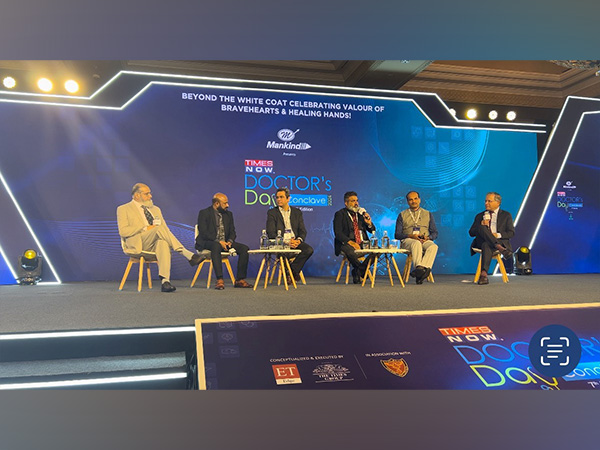Times Now Conclave Advocates Revamped Strategy to Combat Tobacco Addiction on Doctors' Day
The Times Now Doctors Day Conclave emphasized the urgent need for a new approach to tackling addiction-driven non-communicable diseases (NCDs) in India, particularly those caused by nicotine addiction. Experts discussed the complex nature of tobacco's harm and called for innovative public health policies focused on harm reduction.

New Delhi [India], July 5: In a heroic homage to medical practitioners on Doctors' Day, the Times Now Doctors Day Conclave gathered top-tier medical professionals to salute their invaluable contributions while shedding light on India's critical health challenges. Among the focal points was the harrowing impact of tobacco use, a public health scrooge demanding immediate action.
Despite stringent policies aimed at curbing tobacco consumption, the toll remains grievous. Every year, millions succumb to tobacco-related illnesses, straining India's healthcare system to its limits. The Conclave's panel on 'India Needs a New and Comprehensive Approach to Combat Addiction-led NCDs' underscored the necessity for a groundbreaking strategy to tackle addiction-driven non-communicable diseases (NCDs), especially their leading cause - nicotine addiction. Yugal Sikri, Vice Chairperson & Managing Director of RPG Life Sciences, passionately remarked, "Addressing non-communicable diseases is critical, demanding a holistic and comprehensive approach. Alarmingly, one in six NCD-related deaths is attributed to tobacco."
The discussions sprang to life with Yugal Sikri's provocative musing: Is it nicotine itself, or its delivery method, that poses more danger? Dr. Sequeira, a notable public health authority, pressed for a clear demarcation between nicotine and tobacco, lamenting that even professionals are tangled in misinformation. While nicotine hooks users, it is the manifold toxic substances in tobacco smoke that wreak lethal havoc. Hence, a nuanced reassessment of nicotine's role and the harm stemming from its delivery is imperative.
Atish Majumdar, Senior President of Mankind Pharma, spotlighted an overarching challenge - the need for greater awareness to counteract addiction-driven NCDs and bolster harm reduction. Majumdar argued, "Accurately defining addiction is vital. Beyond the menace of tobacco, sugar, and salt also insidiously contribute to NCDs." He advocated for critical health-risk labeling on products entangled in addictive dependencies.
Padma Shri laureate Dr. Mohsin Wali, Senior Consultant at Sir Gangaram Hospital, emphasized the pressing need to safeguard youth well-being in the fight against smoking. He asserted, "Prioritizing the future of our youth is crucial. Now is the opportune moment to address the rise of addiction-driven NCDs, particularly smoking among younger demographics." The panel advocated for a nuanced tobacco market characterization approach - shifting from traditional tobacco-use metrics to a 'harm weighting' or 'risk grading' index. Such a framework would categorize tobacco products along a risk spectrum, with traditional cigarettes as most hazardous and medicinal nicotine products positioned as safer alternatives. This pivot in perspective could galvanize more effective tobacco control strategies.
Dr. Rohan Savio Sequeira, a Consultant Cardio-Metabolic Physician, emphasized the importance of educating medical professionals and pharmaceutical firms on combating addiction. He stated, "Patients ask us how to quit. As front-line responders, we must grasp the concepts of 'harm' and 'harm reduction' thoroughly." Dr. Sequeira also critiqued the limited efficacy of Nicotine Replacement Techniques (NRTs), urging a focus on innovative nicotine delivery systems and emphasizing rural physician education.
Dr. D. Dhanuraj, Founder-Chairman of the Centre for Public Policy Research (CPCR), called for greater exploration of alternative nicotine delivery systems amidst soaring tobacco product taxes. He stressed, "Reducing harm from tobacco use requires involving stakeholders in awareness campaigns. Alternative nicotine delivery systems hold potential for mitigating tobacco harm and merit comprehensive exploration."
The Conclave concluded with a resonant call for a novel public health strategy prioritizing risk-based profiling of tobacco products. By leveraging scientific progress, encouraging transparent discussions among healthcare experts, and implementing trailblazing policies, India can spearhead a transformative battle against tobacco-induced NCDs.
(This story has not been edited by Devdiscourse staff and is auto-generated from a syndicated feed.)










